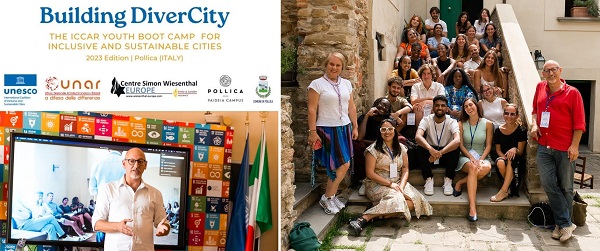A Report by Alex Uberti, Project Manager, Simon Wiesenthal Centre-Europe
Pollica, Italy, 21 September 2023
After its pilot project of July 2022, the second edition of the “Building DiverCity” boot camp took place in Pollica (province of Salerno, Italy) this September.

Alex Uberti presenting the workshop on antisemitism, and with fellow boot-campers.
The boot camp was organized, under the auspices of UNESCO, by the International Coalition of Inclusive and Sustainable Cities (ICCAR), together with the Simon Wiesenthal Centre-Europe, with the support of UNAR (Italian National Office against Discrimination), Paideia Campus (affiliated to the Future Food Institute), Verbe & Lumière-Vigilance and the City of Pollica, which represents itself a unique example of sustainability.
The participating youth – as well as the guest experts and mentors – represented a wide panel of ethnic, cultural and religious diversity... from countries such as France, Italy, Austria, Sweden, Finland, Albania, Moldova, Cyprus, Israel, Turkey, India, Morocco, Cameroon, Mozambique, Canada, Mexico, Brazil and Uruguay. They were all unique, thus equal. They all valued each other’s diversity with mutual respect.
The general concern was the surge of discrimination and hate in the current global environment, thus the intent to shape more tolerant policies in cities, universities and society at large. The training programme included thematic workshops on systemic racism, gender inequality, antisemitism, Islamophobia, anti-LGBTQI+ and anti-Roma discrimination... but also, the evolution of international law and local policies, the implementation of UN Sustainable Development Goals (SDGs), data collection and analysis, moderating social media, etc.
At last year’s inaugural boot camp, the Wiesenthal Centre’s Director for International Relations, Dr Shimon Samuels, had focussed on antisemitism as a tripwire for other forms of discrimination and the need to build solidarity among victims, in particular to counter the surge in conspiracy theories.
This year, the Wiesenthal Centre’s European Project Manager, Alex Uberti, presented historical and contemporary aspects of antisemitism, exposing the persistence of anti-Jewish tropes and decoding the semantics of “anti-Zionism” as well as the modern terminology of hate.
The discussion on antisemitism actually began with an exercise in intersectionality: Uberti mentioned the case of a far-right militant burning a Quran in Stockholm, “which resonates for the Jews, as the Nazis began by burning Torah scrolls and Jewish books in 1933. Likewise, the rejection of refugees recalls the 1938 Evian Conference. Today’s scapegoating of foreigners resembles the blood libels against Jews over the past centuries. The 1992 incitement and genocide in Rwanda or the more recent brutal crackdown on the Rohingya or Yazidi minorities... all evoke Nazi propaganda and the Shoah. Today’s persecution of the Roma and homosexuals in so many countries reminds that they were fellow victims in the Holocaust.”
“Among the tools to avoid repetition of the darkest pages of history, there is education... thus the importance of working with UNESCO. The IHRA definition – of antisemitism, as well as of anti-gypsyism – is an essential baseline for national legislators, as also for local policies or business, campus and sport club regulations. The Centre’s monitoring of book fairs or social media are examples of good practices... We need to know our enemies, where possible, to better fight back!”
Though the intense week delved into global issues, such as extremism and bigotry, polarization and inequality... the boot-campers also shared harrowing personal experience of discrimination and violence suffered in their own towns. Through story circles or consulting with their mentors, the youth shared their experience of isolation or rejection, but also discussed their transition to awareness and commitment to local initiatives that could become global campaigns – from fostering gender equality in northern Mozambique to intercommunity dialogue in Cyprus, from providing elderly care in Moldova to the emancipation of women in Mexico...
In many cases, Simon Wiesenthal’s words resonated, in particular on seeking “Justice, not vengeance” and the need to “find friends near and afar to build defences against the repetition of the Holocaust.”
Of the two young adults from Israel, one is an Indian-born law student at Reichman University. As a member of the Ahmadi community, he spoke of his hometown Haifa, a welcoming refuge for many different religious communities, often persecuted in neighbouring countries: from the Baha’i to the Ahmadiyya, from the Druze to a number of Christian denominations (Catholics, Maronites, Orthodox and Protestants). He attested of the diversity within Israeli society, and the laws guaranteeing freedom of worship and of expression in a challenging regional context.
The second Israeli is a young Jewish student in philosophy, economics and political science at Tel Aviv University. Raised in a Kibbutz, she has become a true “globetrotter” and is deeply concerned by the misrepresentation of Israel and the Jews in international media. They shared the enthusiasm in these days of dialogue with their fellow boot-campers, where new friendships were sealed.
Thus, Pollica and the follow-up networking will encourage boot-campers to become “mediators against discrimination” in their cities, universities or workplaces. The Wiesenthal Centre wishes its young friends success in this endeavour!
In parallel with the DiverCity boot camp, the European Coalition of Cities Against Racism (ECCAR) and UNAR organized a two-day Conference gathering the fourteen Italian metropolitan cities, mainly focused on policies for the inclusion of migrants and minorities. The interaction between municipal officials, civil society experts and young adults to address Italy’s current refugee crisis – encompassing demographics, security, education and economic development – is a case study that requires empathy.
Connecting global to local, the boot-campers joined the citizens of Pollica to render homage to the former Mayor, Angelo Vassallo z”l, murdered by organized crime in 2010. His environmental and social policies had challenged the hate, violence and bigotry of anonymous criminals. His example would inspire the next generation’s quest for dialogue, truth and justice!
* * *
For further information, contact csweurope@gmail.com